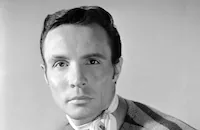The Toast of New Orleans

Brief Synopsis
Cast & Crew
Norman Taurog
Kathryn Grayson
Mario Lanza
David Niven
J. Carrol Naish
James Mitchell
Film Details
Technical Specs

Synopsis
In the early 1900s, in the swamplands of Louisiana, the Cajun fishing village of Bayou Minou is buzzing with activity as it prepares for the annual celebration of the blessing of the fishing fleet. During the festival, the village hosts two guests of honor from New Orleans: opera star Suzette Micheline and opera director Jacques Riboudeaux. Soon after arriving in Bayou Minou, Suzette, who has a romantic understanding with Jacques, meets the handsome and uncouth Pepe Abellard Duvalle, the nephew of fisherman Nicky Duvalle. Though Suzette is initially attracted to Pepe, she soon becomes perturbed by his crude manners, and is angered when he interrupts her musical recital at the festival and turns her solo into a duet. Jacques, however, is greatly impressed with Pepe's beautiful tenor voice, and invites Pepe to train in New Orleans and sing in his opera. Pepe initially rejects the offer, but later changes his mind when a ferocious storm sinks his uncle's fishing boat. Pepe and Nicky leave Bayou Minou in the hope that Pepe will be able to make enough money to buy a new boat. Soon after Pepe arrives in New Orleans, Jacques decides he must make Pepe more presentable in public, and enlists the help of Suzette to soften his "rough edges." Jacques also hires his well-heeled friend Oscar to teach Jacques some high society manner. Jacques later takes Pepe to Maestro P. Trellini, who is amazed at Pepe's voice and agrees to train him. One evening, Pepe and Nicky join Jacques and Suzette for an elegant dinner at a fancy restaurant, but they nearly spoil the evening with their crude country manners. While Oscar continues to teach Pepe about social graces, Trellini makes great progress training Pepe's voice. Jacques eventually becomes so confident in his new tenor that he makes plans to include Pepe in a worldwide tour of his opera. Suzette takes great pleasure in refining Pepe's behavior and tastes, and a romance appears inevitable. Suzette, however, is torn between her attraction to Pepe and her desire to please Jacques, who is responsible for advancing her singing career. One day, when Pepe tries to kiss Suzette, she rejects him and then hurriedly asks Jacques to marry her. Nicky, meanwhile, becomes homesick and impatient with his nephew's efforts to become rich and vows to return to Bayou Manou. Later, Pepe tells Jacques that he is in love with Suzette and that he intends to leave New Orleans because she has spurned him. Although Jacques now realizes that Suzette proposed to him only to save her career, he encourages Pepe to stay in New Orleans and continue his opera training. Tina and Pierre, two of Pepe's friends from Bayou Manou, visit Pepe one day, but they are disappointed when they discover that their fun-loving friend has become cold and rigid. Eventually, Suzette and Jacques, too, become alarmed at the change in Pepe's personality. After rejecting a marriage proposal from Pepe, Suzette explains to Jacques that she was in love with Pepe before he became so refined, but no longer has feelings for him. When Tina and Pierre leave New Orleans because they are bored, Pepe finally realizes that he has changed for the worse. During a performance of Madame Butterfly , Pepe reverts to his natural behavior and, as a result, is able to reignite his romance with Suzette.

Director

Norman Taurog
Cast

Kathryn Grayson

Mario Lanza

David Niven

J. Carrol Naish

James Mitchell
Richard Hageman

Clinton Sundberg

Sig Arno

Rita Moreno
Romo Vincent
George Davis
Marietta Canty
Alex Gerry
Wallis Clark
Paul Frees
Henry Corden
Nick Thompson
Carmella Restivo
Charles Mauu
George Nardelli
Jacques George
Ernesto Morelli
George Meader
Jean Del Val
Bethe Douglas
Gene Brown
Guy De Vestel
Dino Bolognese
Eduard Moreno
Robert Emmett Keane
Nino Pipitone
Fred Essler
Leon Belasco
Louise Bates
Andre Charlot
Sandy Lawrence
Loulette Sablon
Helen Dickson
Betty Daniels
Mary Benoit
John Piffle
Mitchell Lewis
Michael Kostrick
Mike Tellegen
Paul Bryar
George Humbert
Crew
Armando Agnini
Jules Barbier
Georges Bizet
Dick Borland
Nicholas Brodszky
Sammy Cahn
Reggie Callow
Michel Carré
Daniel B. Cathcart
Gaetano Donizetti
Grace Dubray
Friedrich Von Flotow
Robert Franklyn
Jane Garten
Cedric Gibbons
A. Arnold Gillespie
Sy Gomberg
James Gooch
Johnny Green
Sydney Guilaroff
Ludovic Halévy
Henri Jaffa
Jimmie James
Eugene Loring
Henri Meilhac
Wolfgang Amadeus Mozart
Warren Newcombe
Joe Pasternak
Richard A. Pefferle
Sergei Petschnikoff
Francesco Maria Piave
Walter Plunkett
Lorenzo Da Ponte
Giacomo Puccini
Friedrich Wilhelm Riese
Helen Rose
Gene Ruggiero
Conrad Salinger
Douglas Shearer
J. Frank Shugrue
William Snyder
Georgie Stoll
Ambroise Thomas
William J. Tuttle
Giuseppe Verdi
George Wells
Edwin B. Willis
Lothrop Worth

Videos
Movie Clip



Trailer
Film Details
Technical Specs

Award Nominations
Best Song
Articles
The Toast of New Orleans
By Violet LeVoit

The Toast of New Orleans
Quotes
Trivia
Notes
The working titles for this film were Serenade to Suzette, Kiss of Fire and This Weekend Is Yours. The film marked the motion picture acting debut of composer and conductor Richard Hageman. According to a December 1949 Daily Variety news item, Armando Agnini, who staged the opera sequences in the film, worked for the Metropoitan Opera. Nicholas Brodszky and Sammy Cahn's song "Be My Love" was nominated for an Academy Award.















